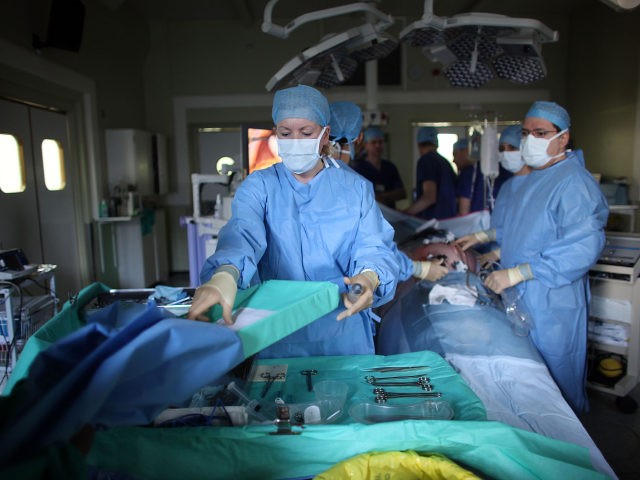Nearly five million people in England were waiting for a routine operation in February, the highest level in 14 years.
According to NHS England figures, pressure on the NHS treating Chinese coronavirus patients was at its highest in January and February of this year.
In February, 4.7 million people were waiting for their operations, with nearly 388,000 waiting for more than a year — higher than the pre-pandemic figure of just 1,600, according to a BBC report on Thursday.
Urgent operations, for conditions like cancer and other life-threatening conditions, went ahead, with two million taking place during the winter peak. But procedures such as for cochlear implants or hip and knee operations were either postponed or cancelled.
The Metro reported that many hospital surgery theatres were converted into intensive care units to deal with coronavirus patients.
As of February, 327,663 people in England were waiting more than six weeks for tests such as MRIs or non-pregnancy-related ultrasounds. The equivalent number waiting the same timeframe for these procedures in February 2020 was 29,382.
Remarking on the report, Mr Tim Mitchell, vice-president of the Royal College of Surgeons of England, told the BBC: “People have been patient as they’ve seen the battering the pandemic has given the NHS, but how much longer can they be expected to wait?”
The NHS Confederation, which speaks on behalf of bodies that provide NHS services, predicts that up to 6.9 million people could turn out to be on a “hidden waiting list” of those needing referrals but who have not been officially put on a list.
While Tim Gardner from the charity the Health Foundation also said there could be around six million “missing patients” who “either didn’t seek care or couldn’t access services during the pandemic”.
Prime Minister Johnson said of the figures that he had “no doubt” the NHS would be able to catch up, saying that the government had put an additional £92 billion into the NHS this year.
Mr Johnson said on Thursday: “We’re going to make sure that we give the NHS all the funding that it needs, as we have done throughout the pandemic, to beat the backlog.
“We’re going to do whatever it takes.
“The NHS has done an incredible job so far, I have no doubt they’ll be able to tackle this as well.”
The figures come less than a week after analysis on NHS England data by the Institute for Public Policy Research (IPPR) suggested that the drop in urgent cancer referrals “risks creating a ticking time bomb for missed cancer cases and a decade of disruption for health services”.
The analysis said that due to the impact of the pandemic, the disruption could result in survival rates for cancers “going backwards”. The UK already has one of the worst survival rates for cancer amongst OECD countries, with an OECD report from 2016 putting the survival rate for breast and cervical cancer below the EU average.
Earlier this month, it was reported that the government was decommissioning the NHS Nightengale field hospitals established to deal with waves of coronavirus patients, some of which had not treated a single person for the Chinese since they were opened in April 2020.
However, some were repurposed for dealing with other treatments, such as the Yorkshire Nightengale in Harrogate which was used for radiology outpatients for scans.
As Breitbart London reported at the time, there were claims that had they been used as intended, there would not have been enough trained nurses and doctors to staff it.

COMMENTS
Please let us know if you're having issues with commenting.